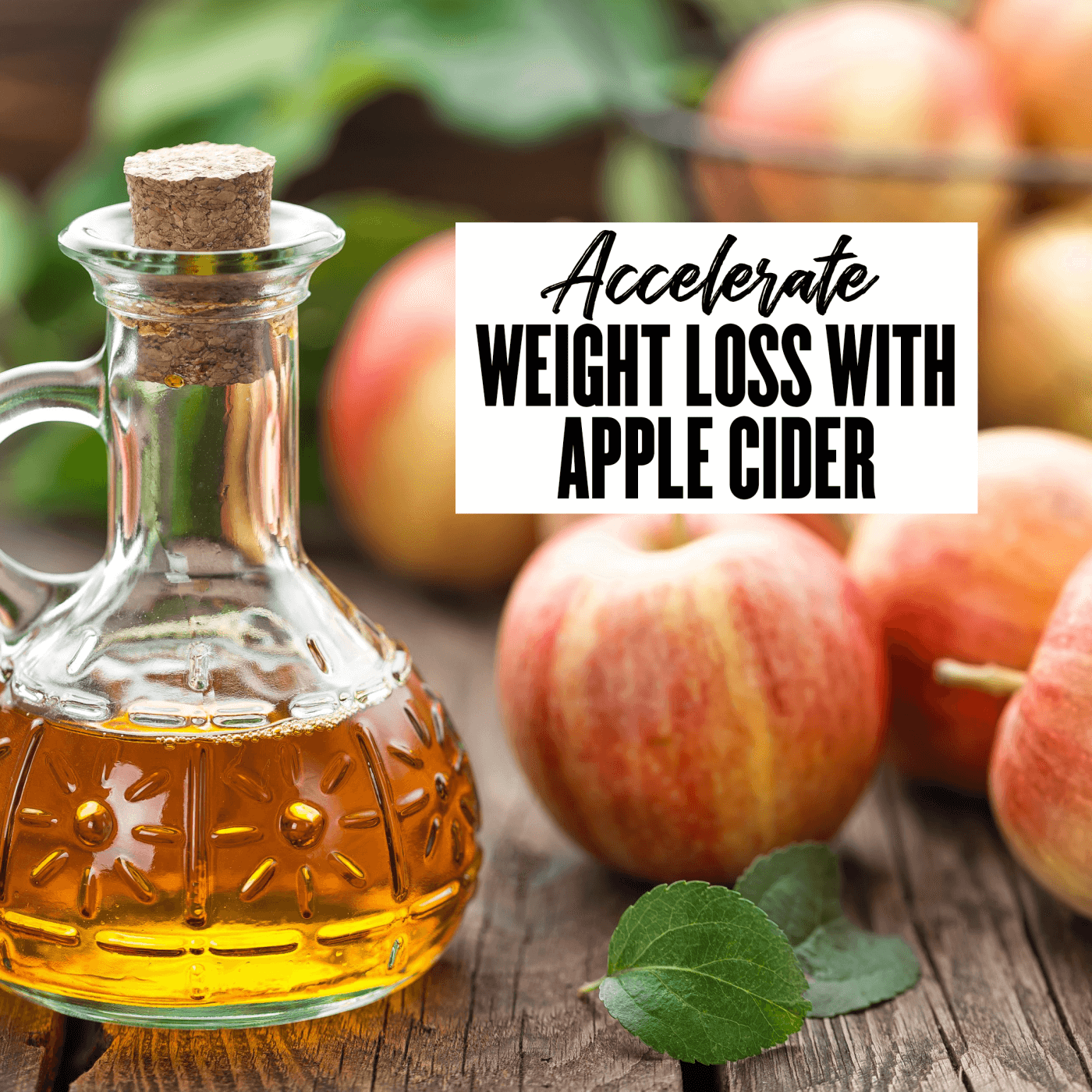
Accelerate Weight Loss with Apple Cider Vinegar
Jason Nista
Nutrition
|
Weight Loss
7 minute read
We all love super hacks for healthy living, more energy, fat loss, and strength, and one that has gained a lot of popularity in the past couple of years is apple cider vinegar for weight loss.
Claims of many health benefits from its supporters like aiding weight loss or reducing cholesterol have been mentioned all over the internet.
But is there really some truth to it? Read on to know more about these crucial facts discussed in the article:
- Apple cider vinegar has mild effects on weight, blood glucose, insulin sensitivity, and triglycerides.
- Use it in moderation and be conscious of potential risks.
- Monitor effects and discontinue if side effects occur.
What is Apple Cider Vinegar?
Vinegar, from the French vyn egre (sour wine), is an acidic liquid produced through the fermentation of ethanol by bacteria, the acid is most specifically acetic acid.
Apple cider vinegar, one of the best supplements for weight loss, is made from fermented apple juice. It contains the usual acetic acid content of any vinegar and smaller amounts of various phytonutrients found in apples. Just so you know phytonutrients are chemicals that can only be obtained from plant sources. (yes there are also zoo nutrients that can only be obtained from animal sources, but that goes off-topic). Like many other kinds of vinegar, it has a very long shelf life and a distinctive sour and acidic flavor, and it has many practical uses like pickling, stimulating chemical reactions while cooking and baking, tenderizing meat, and even as a disinfectant or cleaning product!
Analyzing the most common health claims.
A lot has been said about apple cider vinegar for weight loss and these claims might seem to be too good to be true, so let’s take a look at all the benefits:
-
Controlling blood glucose levels: Although more research is needed and the results are not strong, there is moderate evidence showing that intake of apple cider vinegar has a minor effect on controlling blood glucose levels after meals, and also a mild improvement for people with type 2 diabetes.
-
Weight loss: here we also have moderate evidence that suggests a minor effect on diminishing appetite, fat loss, and weight management. More studies are needed to confirm the correlation between apple cider vinegar and weight loss, but so far a minor effect is shown.
-
Insulin sensitivity: here the evidence is a bit mixed, for healthy individuals there doesn’t seem to be a lot of benefits. However, there is evidence of an effect on liver function for diabetes (experiments conducted in rats that still need testing in humans) and even in women with PCOS helping restore ovarian function and insulin sensitivity.
-
Triglyceride reduction: Here we see important evidence that there’s a minor effect on reducing triglycerides in the blood, both for obese people as well for people without diabetes or overweight. There are more studies to be made but the evidence shows a statistically significant greater reduction in triglycerides, very little change in total cholesterol, and a slightly greater increase in HDL.
So as we can see the claims might not be too crazy after all. Remember all of these effects seem to be mild and not as pronounced as we would hope. However, they are real and could offer some benefits combined with a proper weight loss meal plan and physical activity regimen.
Safety and potential risks
Here’s the tricky part. It has a lot of benefits. A lot has been mentioned about how to drink apple cider vinegar for weight loss, but there are also some safety concerns that we should also address. Due to its acidic nature, there’s the potential for tissue damage for example on the enamel of teeth, the esophagus, gastroesophageal sphincter, skin, and mucous. It might also cause nausea if ingested on an empty stomach or in some cases it was shown to increase the likelihood of gastric cancer when people consumed pickled food in excess, but this is true for all types of vinegar.
All of these studies show a potential for risk but they all have something in common: they happen when consumption is excessive or when taken in an appropriate manner.
Ultimately it is up to the consumer, but the keywords here are “moderation” and being “smart” about it. Here’s our most important advice on how to go about this and how to stay safe while trying.
-
You are the one that has to make the decision and see if it would benefit you. Obviously make sure you don’t have a preexisting health condition that could be aggravated by it, for example, a stomach ulcer.
-
There are safe ways to consume it without putting yourself in danger and enjoying the enhanced flavor: take it after your meals, add it to your salads or soups, take it diluted with water before a meal, etc. All of these are safer and can prevent potential side effects.
-
Again, the key is always moderation, don’t overdo it, and stop if you feel it is not good for you. The previously mentioned studies all were conducted on doses under 30 ml a day and spread throughout the meals, so be safe about it and don’t exceed that amount. By the way, 30 ml is a little less than 2 tablespoons.
-
If you’re willing to try, be curious and scientific about it. Try it for a couple of weeks and have a journal of how you’re feeling and if you’re seeing the effects you were hoping for. If you do, you can go on but remember to take a break every now and then and not consume it in excess. And if you don’t see the result you wanted be critical about it and stop, there is plenty of other ways to improve your health.
Final Thoughts
The claims aren't too crazy, but there's some evidence of real benefits. Consult your doctor before trying any nutritional advice, especially if you have existing medical conditions. Consume it with food, not on an empty stomach. Limit your intake to 30ml per day (less than 2 tablespoons). Be critical of its effects and stop if you don't see the intended benefits. Keep a journal to track progress. If you experience any unwanted side effects, stop using it. It adds flavor to meals and can be used sparingly.
So there you have it. The truth about apple cider vinegar for weight loss, the good, and the ugly. Let us know if you’ve tried it and what result you’re getting from it. Stay safe and enjoy.
FAQ
How to drink apple cider vinegar for weight loss in 1 week?
To drink apple cider vinegar for potential weight loss benefits in one week, dilute 1-2 tablespoons of ACV in 8-10 ounces of water and consume it. However, it's important to consult with a healthcare professional before making any dietary changes or trying new supplements. Keep in mind that scientific evidence supporting ACV's effectiveness for weight loss is limited.
When to drink apple cider vinegar for weight loss?
The timing of when to drink apple cider vinegar for weight loss is not critical. However, some people prefer to consume it before meals to potentially help control appetite and reduce calorie intake. You can drink it 15-30 minutes before a meal or incorporate it into your meal as a dressing or ingredient. It's important to dilute it with water and consider consulting with a healthcare professional before making any dietary changes. Remember, the effectiveness of apple cider vinegar for weight loss is not well-established and individual results may vary.
What to mix with apple cider vinegar for weight loss?
You can mix apple cider vinegar with water or add a teaspoon of honey or lemon juice to improve the taste when using it for weight loss purposes.
Where can I get apple cider vinegar to drink for weight loss?
You can find apple cider vinegar for weight loss at grocery stores, health food stores, or online retailers.
Related Articles
Gluten-Free Diet Plan for Beginners: Embrace a Better You
12 minute read
Are Carbs Bad For Me? Navigating the Good vs Bad
14 minute read
Protein Consumption: Finding the Right Balance
12 minute read



